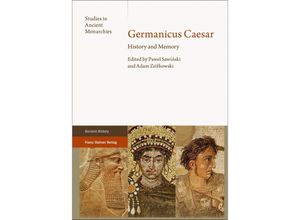The historical memory of the principate is for obvious reasons dominated by the emperors with
one exception: Germanicus Caesar who though not a ruler appears in the sources as if he had
been one. Chosen by Augustus as his ultimate heir the embodiment of the dynastic principle
yet never the emperor put at the head of one third of the Roman army to reconquer Germania
but recalled before the task's completion the last to hold an imperium which made him almost a
co-regent of the emperor cut short by his sudden death - he reflects like no one the
transition of the principate from the Augustan phase to its mature form. Equally significant is
the longevity of the memory of his person and the variety of ways in which it was expressed:
the only non-emperor commemorated in the Feriale Duranum he figures on coins struck long after
the end of the Julio-Claudians and an edict of his quoted in a legal text of the 3rd century
appears in the Digesta. To give justice to his memorability our contributions approach him in
the perspective of not only history classical philology art history archaeology and
numismatics but also Egyptology and Roman law.



